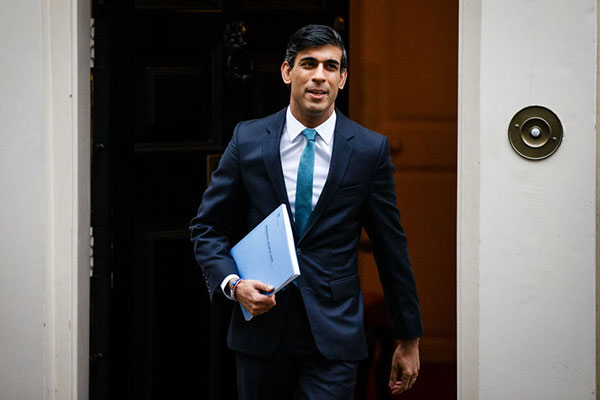Spending Review: UK economy won’t recover until late 2022
The chancellor left taxes alone for now, but spent £280 billion that has to repaid.
25th November 2020 15:08
by Sam Barker from interactive investor
The chancellor left taxes alone for now, raising the question of how £280 billion of spending measures will be paid for.

The UK economy will not get back to pre-coronavirus levels until the fourth quarter of 2022, according to Chancellor Rishi Sunak today.
In his Spending Review, Sunak said the country’s “economic emergency has only just begun”.
The Office for Budget Responsibility has said gross domestic product (GDP) will fall 11.3% this year. Next year it will grow 5.5%, then 6.6% in 2022.
Borrowing will total £394 billion this year, around 19% of GDP, according to Sunak. This is the highest in UK peacetime history, and it is set to be £164 billion next year.
The national debt will be equivalent to 91.9% of GDP this year, rising to 97.5% by 2025, and unemployment is expected to hit 7.5% of the workforce next year, or 2.6 million people.
The chancellor also confirmed a previous announcement that public sector pay would be frozen in 2021. However, a million doctors, nurses and NHS workers will get pay rises.
Spending measures
The chancellor also announced £280 billion of spending to help tackle the ongoing Covid-19 crisis. This includes £18 billion for Covid-19 tests, vaccines and PPE, £3 billion for the NHS and £1 billion to let delayed operations go ahead.
Around £4.6 billion will help people get back to work, £4 billion will boost infrastructure and £3 billion will be given to councils.
Approximately £2.6 billion has been earmarked for devolved governments in Scotland, Northern Ireland and Wales.
The rail network will get £2 billion.
No tax hikes – for now
However, the chancellor made no changes to taxation for the time being.
In July, Sunak asked the Office for Tax Simplification to review capital gains tax, while increases to income tax, VAT and National Insurance have also been mooted to help pay the country’s growing coronavirus bill.
Pensions tax relief has also escaped any increases. There were rumours at previous spending reviews that this perk could be scrapped.
Jason Broomer, investment director at investing researchers Square Mile, said tax rises were still on the cards from the chancellor.
Broomer said: “The question is, how popular will he become once he has to raise taxes and cut spending to pay for all this? Covid-19 has left the public finances in a dreadful state that will take years to address.
“Hopefully, decent growth will go some way to address these, but I suspect painful decisions will have to be made later on.”
Sunak also ruled out watering down the state pension triple lock, which several think tanks suggested earlier this year could be trimmed to save money.
Market reaction
The FTSE 100 barely moved following the chancellor’s announcements. It stood at 6,394 points when his speech started and was 6,390 two hours later.
Rohan Malik, EY’s managing partner for government and infrastructure, said news of Covid-19 vaccines and the spending announced today signalled future economic growth.
He said: “The combination of dedicated spend for the NHS estate and frontline services to tackle the impact of the pandemic, enhanced support for the labour market and economy-boosting infrastructure projects, all underpinned by the aspiration of trailblazing a global green industrial revolution, indicates cause for confidence in the UK’s journey to Covid-19 recovery against the backdrop of a difficult long term economic forecast.”
These articles are provided for information purposes only. Occasionally, an opinion about whether to buy or sell a specific investment may be provided by third parties. The content is not intended to be a personal recommendation to buy or sell any financial instrument or product, or to adopt any investment strategy as it is not provided based on an assessment of your investing knowledge and experience, your financial situation or your investment objectives. The value of your investments, and the income derived from them, may go down as well as up. You may not get back all the money that you invest. The investments referred to in this article may not be suitable for all investors, and if in doubt, an investor should seek advice from a qualified investment adviser.
Full performance can be found on the company or index summary page on the interactive investor website. Simply click on the company's or index name highlighted in the article.